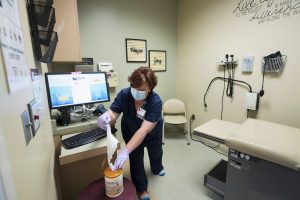CSP Team Note: This post was originally published on Novant Health’s Healthy Headlines. We thank them for allowing us to share it with you. To subscribe to Novant Health’s Healthy Headlines newsletter, click here. Click here to find a physician. Novant Health is also offering a self-guided assessment tool to help patients determine if they should seek care for COVID-19. (Note: This assessment is not a substitute for professional medical advice, diagnosis or treatment and should not be used if patients are experiencing a life-threatening emergency.)
Safety remains the top priority against COVID-19
Novant Health is adding enhanced safety measures in every location to protect patients and team members against COVID-19.
Some non-time sensitive and nonemergency surgeries and procedures were reestablished May 4. Additionally, Novant Health clinics have reinstated appointments that were previously delayed, starting with pediatric well checks, chronic disease and acute-issue visits.
Preventing spread of germs and infection is front-of-mind during the coronavirus pandemic. But at Novant Health, it always has been.
“We manage preventing the spread of infectious diseases every day,” said Susan DeCamp-Freeze, Novant Health senior director of infection prevention. “We’re very diligent about hand hygiene, masking, social distancing and constant cleaning.”
Here is a breakdown of just some of the steps being taken to keep patients safe:
Clinic visits
All patients and team members are screened prior to entering a clinic. Patients are telephoned 24 hours or so before appointments and asked screening questions. When a patient arrives, their temperature is taken and they’re asked screening questions again.
Patients are allowed one healthy person to accompany them per visit, and that visitor is screened and their temperature is taken. Visitors must be 13 or older, and will be asked to wait in the exam room with the patient. Additional visitor restrictions apply at Novant Health Women’s Health Institute clinics and Cancer Institute clinics.
– Public areas like lobbies and bathrooms are cleaned every 30 minutes. Examination rooms are cleaned after each use. Any material that can’t be disinfected is removed from the lobby. The use of pens, for instance, is avoided if possible and they’re disinfected after each use. Patients are encouraged not to use water fountains.
– Clinics are allowing more time between appointments for cleaning and social distancing. The number of people in the lobby is monitored, and if necessary, patients may be asked to wait in their vehicle and are notified via text or phone call when to enter the clinic. Floor markings are 6 feet apart and furniture has been rearranged to maintain social distancing.
– All team members are required to wear appropriate personal protective equipment (PPE). Every team member is masked at all times, DeCamp-Freeze said. A patient is required to wear a mask. If they don’t bring one, the clinic will provide one.
Surgery at a hospital
– Every patient is screened for COVID-19 and tested 72 hours before their arrival for surgery. If results are negative, the patient is required to be quarantined during that time leading up to the day of surgery. If results are positive, surgery may be delayed or canceled. When patients arrive for surgery, they’re screened again before entering the hospital.
– Every person in the hospital – team members, patients and visitors – is provided a mask to wear.
– Operating rooms are “positive pressured,” which means air must be pressured to flow out of the room so there’s no potential for air coming into the room and possibly exposing a patient to infection. That’s not anything new since COVID-19, just normal procedure in a setting with robust cleaning and sterilization.
– To further protect patients, ORs are set to completely “turn over” the amount of fresh air every three minutes to further enhance infection prevention. In an average office building, it can take two to four hours for a turnover of fresh air.
– New machines, called HEPA air scrubbers, are being used, DeCamp-Freeze said. It is a portable filtration system that removes particles and chemicals from the air within a given area. These machines draw air in from the surrounding environment and pass it through a series of filters to remove contaminants.
Also, intubation boxes (made of see-through plexiglass) are used to minimize the dispersal of any germs when a patient is being intubated.
DeCamp-Freeze said there’s an appreciation among patients and visitors adjusting to the new settings and policies.
“They’re noticing that we’re doing things to keep everyone safe,” she said. “It might take a little longer, but they’re waiting their turn. They’ve mentioned to our team members that they appreciate it as things are being cleaned. We remind them to put your mask on and wash your hands. The biggest difference is now we’re not asking, we insist that you do it.”
Click here to find a doctor.
Novant Health
Healthy Headlines
Facebook
Instagram
Twitter
YouTube





